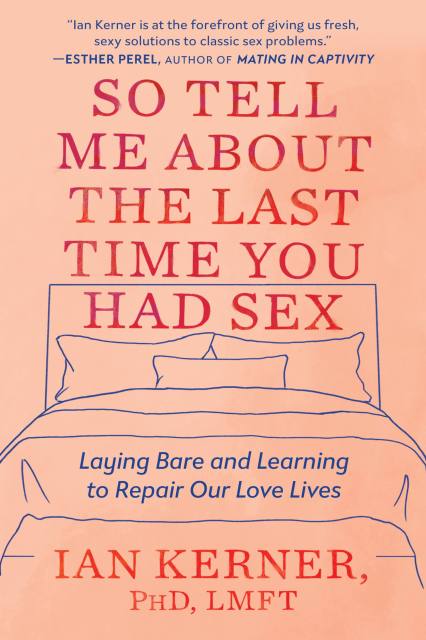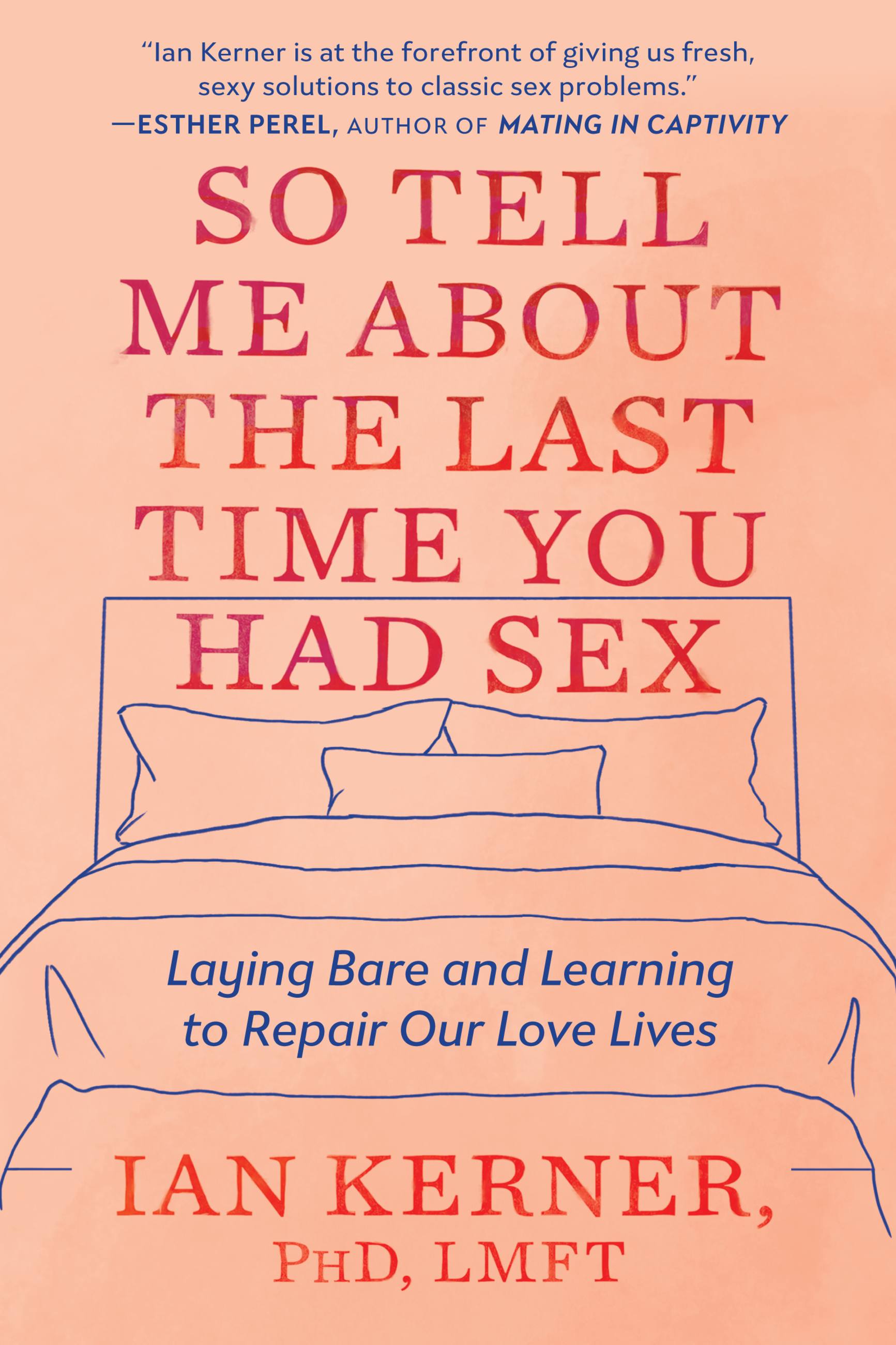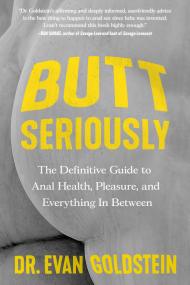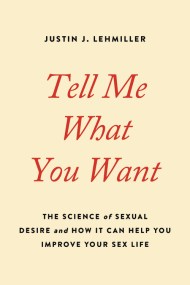Promotion
Use code BEST25 for 25% off storewide. Make sure to order by 11:59am, 12/12 for holiday delivery!
By clicking “Accept,” you agree to the use of cookies and similar technologies on your device as set forth in our Cookie Policy and our Privacy Policy. Please note that certain cookies are essential for this website to function properly and do not require user consent to be deployed.
So Tell Me About the Last Time You Had Sex
Laying Bare and Learning to Repair Our Love Lives
Contributors
Formats and Prices
- On Sale
- Apr 19, 2022
- Page Count
- 368 pages
- Publisher
- Balance
- ISBN-13
- 9781538734834
Price
$19.99Price
$25.99 CADFormat
Format:
- Trade Paperback $19.99 $25.99 CAD
- ebook $11.99 $15.99 CAD
- Audiobook Download (Unabridged) $27.99
This item is a preorder. Your payment method will be charged immediately, and the product is expected to ship on or around April 19, 2022. This date is subject to change due to shipping delays beyond our control.
Buy from Other Retailers:
Dr. Ian Kerner is a Sherlock Holmes of the bedroom—a sexual detective helping individuals and couples solve the mystery of their sexual distress. His secret weapon? Anaylzing your “sex script.”
Kerner takes a magnifying glass to a recent sexual event, examining the entire sequence of interactions—beginning, middle, and end—from multiple angles. In those details—the what, where, when, and why of the last time you had sex—all the clues of what went wrong are revealed and the mystery of how to create mutual pleasure can be solved. When our sex scripts work, we lose ourselves in mutual pleasure; but when they fail, it’s all we can do not to ruminate over the details. What can be learned by looking at your sex life in action?
With wit and warmth, the nationally recognized sex therapist and author of the smash hit She Comes First shows readers how to tap into their erotic personalities and realize their sexual potential. Dr. Kerner provides the tools and techniques you need to assess, fix, and expand your sex scripts, as well as discuss many common sexual problems that get in the way of happy endings. With the help of decades of clinical insight, the latest sexual science and research, valuable homework assignments, case studies, and more, this insightful and original book strips away discomfort and offers couples not just the ability to talk about sex, but the ability to actually do something about it.
-
“From breaking out of a sex rut to managing mismatched libidos, Ian Kerner is at the forefront of giving us fresh sexy solutions to classic sex problems.”Esther Perel, author of Mating in Captivity
-
"Even in therapy, sex seems like the one topic people need to talk about most but don't know how. Thankfully, renowned sex therapist Ian Kerner has come to the rescue for everyone who has wanted more out of their erotic life but felt stuck, confused, or just plain frustrated. Combining decades of clinical research and real people's stories, this elucidating guidebook is a must-read for anyone interested in creating a richer, deeper romantic life. There is warmth, compassion and clarity on every page."Lori Gottlieb, New York Times bestselling author of Maybe You Should Talk To Someone
-
"Ian Kerner is a voice of equal parts compassion and logic. He speaks equally to men and to women, equally to people with great sex lives and people who are struggling. Ian's work is essential in the world of sex positive writing."Emily Nagoski, Ph.D., New York Times bestselling author of Come As You Are and Burnout
-
“Ian Kerner’s book is refreshingly informative. His compassion and kindness gently disarm shame, promoting the kind of communication and self-interrogation that are, ultimately, key to experiencing joy in sex.”Peggy Orenstein, New York Times bestselling author of Girls & Sex and Boys & Sex
-
“What a fascinating book on the how-to of sex—it’s packed with riveting data and great advice: Either you’ll be gratified that you are doing everything right or you’ll pick up a pile of truly valuable tips. Kerner is a wise man--it's a compelling read.”Helen Fisher, Ph.D., Author of Anatomy of Love
-
“Is the air you breathe oxygenated with a little bit of eroticism?” asks bestselling author and sex therapist Ian Kerner. If it is, then you will savor this book which, (as the title indicates), invites us to look through the window of our last sexual experiences to illuminate our sex lives and what they could become. If it isn’t then you must buy this book today! Kerner has created another instant classic for individuals, couples and their therapists who are willing to consider what last night could mean for tomorrow."Peggy J. Kleinplatz, Ph.D., Professor, Faculty of Medicine, University of Ottawa, Canada
-
"Based on real stories and linked by real data, Kerner's So Tell Me About The Last Time You Had Sex is a look into the sex lives of people that will serve to normalize, validate, and importantly, inspire! This book is for sex therapists, individuals seeking to improve their sex lives, and anyone who wants to turn good sex into great sex!"Lori A. Brotto, PhD, author of Better Sex Through Mindfulness
-
"For any couple struggling to make sense of their fickle sex drives, dwindling desires and disappointing sexual experiences, Dr. Kerner’s latest book is the first step towards living healthier, fulfilling and more pleasurable sex lives. This book will transform not only the sexual relationship you have with your partners but the one you have with yourself. It's a must read for anyone who is ready to let go of their limiting beliefs to make way for sexual discovery and satisfaction."Emily Morse, Doctor of Human Sexuality, Founder & CEO, Sex With Emily
-
“So Tell Me About the Last Time You Had Sex is full of useful advice. . . it's likely every couple can benefit from giving it a read."Your Tango
-
"Much like Ian’s therapy work, his books are action-oriented and provide concrete examples, strategies, and homework to help individuals adapt their behavior in the bedroom."Dating News
-
"A masterpiece! Most people experience sexual difficulties at some point in their lives and Kerner's book is here to help people move through them to create more pleasurable, connecting, affirming sex lives. Highly recommended!"Debby Herbenick, PhD, author of Because It Feels Good
-
“So Tell Me About the Last Time You Had Sex is simply a delightful book! It tells you how to focus down and unpack your sexual dance and make it rock! More than this it's so easy to read: down to earth and so eminently practical. A great acquisition for anyone who wants to improve their sex life.”Sue Johnson, Author of Hold Me Tight: Seven Conversations for a Lifetime of Love
-
“Ian Kerner is the real deal. In So Tell Me About the Last Time You Had Sex, he uses the most essential form of communication—storytelling—to help couples follow the thread from their stuck, unsatisfying scripts back to the deep tender core of vulnerability that underlies them. Filled with practical exercises, Kerner addresses an array of sexual challenges and shows how they can become opportunities for erotic growth. He also inspires his readers to expand their erotic repertoire through flexibility, creative imagination, and more meaningful sexual conversations with themselves and their partners. I can't think of a more hopeful, humane and knowledgeable guide for navigating the sometimes vexing impasses of couple sex.”Daphne de Marneffe, PhD, author of The Rough Patch: Marriage and the Art of Living Together
-
“Kerner dusts off the traditional concept of a ‘sex script’ and polishes it to a high sheen. In his hands, this humble tool becomes a powerful key to deeper sexual aliveness. This is a highly original book. It’s also playful, deeply personal, unfailingly kind, and clearly a labor of love. I can’t think of any other sex writer who can discuss Aristotle’s Poetics together with the neuroscience of orgasm, but Kerner does it all with unfailing skill. Highly recommended!”Stephen Snyder, M.D., author of Love Worth Making
-
"Ian Kerner is a gem of a sex therapist and a masterful storyteller. This book is insightful, practical, accessible, and most of all, helpful. Written in an extraordinarily comfortable and engaging style, Kerner has produced a book that will not only grab the reader's attention and interest, but is sure to enhance the sexual, emotional, and relational lives of its audience. Much like his earlier work, She Comes First, So Tell Me About The Last Time You Had Sex is a book that will endure for years. I am sure to recommend this text to my patients with frequency and enthusiasm!"Daniel N. Watter, Ed.D., Past-President, The Society for Sex Therapy and Research (SSTAR)
-
"Does the sex between your ears or your sheets needs a script update? You’ve come to the right place. Ian Kerner brings together up to the minute sexual science with the highly personal art form of sexual pleasure to give readers a master class in sexual script writing. Full of practical and knowledgeable ideas for rewriting your last forgettable sexual experiences into sexual narratives worth repeating and retelling."Doug Braun-Harvey, MFT, Co-Author of Treating Out of Control Sexual Behavior: Rethinking Sex Addiction
-
“My goodness, he’s done it again. After helping men become “cliterate” with She Comes First and guiding women through the intricacies of male passion with He Comes Next, Ian Kerner fearlessly leads us to explore one another. His guidance is at once fresh, human and state of the art. What is your erotic blueprint? Dispelling one myth after another So Tell Me About the Last Time You Had Sex invites you on a journey toward a deeper, richer and more authentic sexuality.”Terrence Real, author of The New Rules of Marriage
Newsletter Signup
By clicking ‘Sign Up,’ I acknowledge that I have read and agree to Hachette Book Group’s Privacy Policy and Terms of Use







